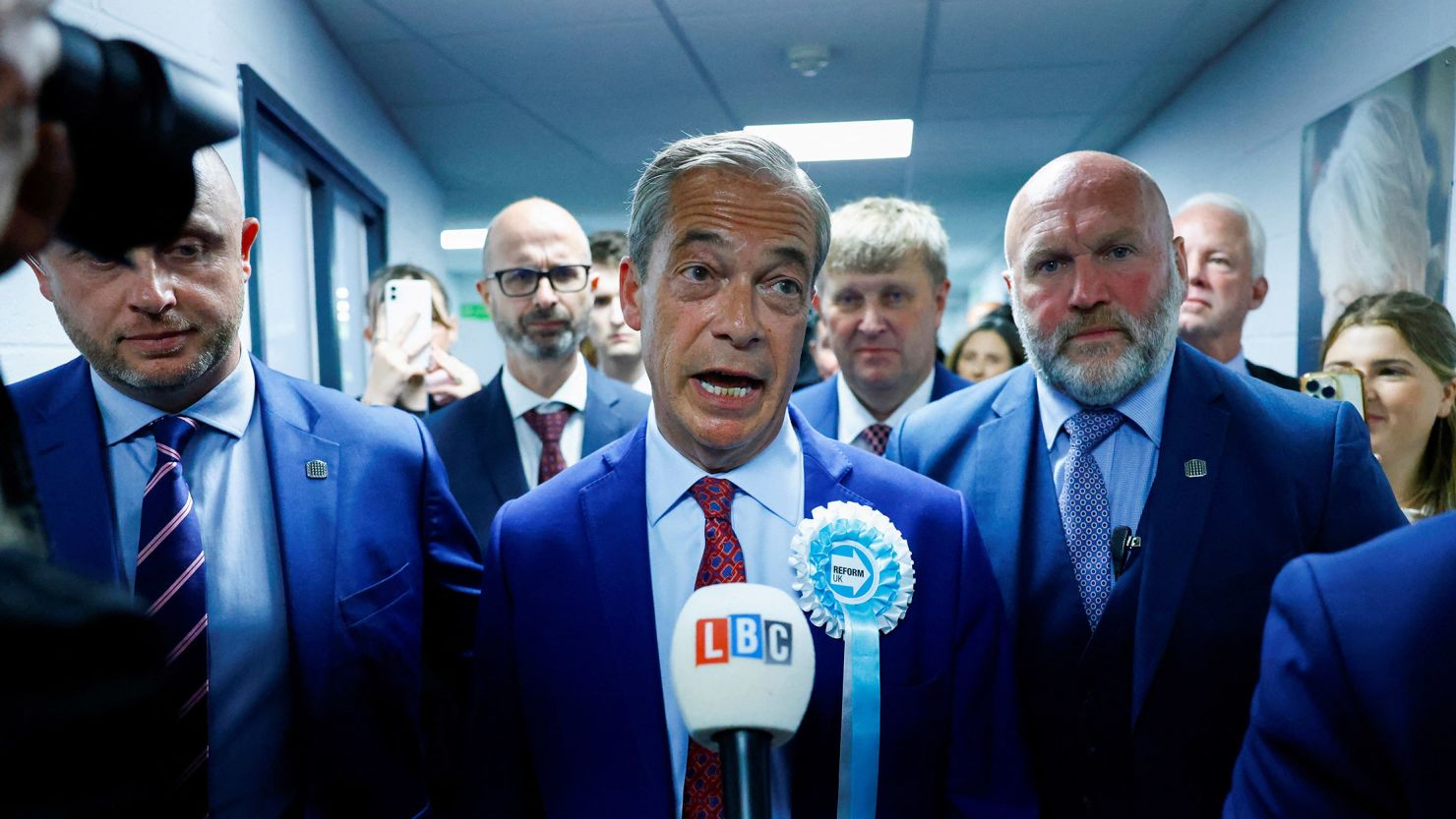Nigel Farage: Reform Party Prefers SNP Win In Next Holyrood Election

Table of Contents
The political landscape in Scotland is ever-shifting, and a recent statement from Nigel Farage's Reform Party has sent shockwaves through the UK. The party has surprisingly indicated a preference for the Scottish National Party (SNP) to win the next Holyrood election. This seemingly contradictory position raises eyebrows and necessitates a deeper examination of the strategic implications. This article will explore the reasons behind this unexpected endorsement and analyze its potential consequences for the Scottish independence movement and the UK as a whole.
The Reform Party's Rationale: A Strategic Gambit?
The Reform Party's apparent support for an SNP victory, while seemingly paradoxical given their contrasting ideologies, might be a shrewd strategic move. Several factors could underpin this unconventional approach.
-
Weakening Unionist parties: By tacitly supporting the SNP, the Reform Party could weaken the traditional Unionist parties – the Conservatives and Labour – in Scotland. This could create a more favorable political environment for the Reform Party's own growth in future UK-wide elections, diverting the focus and resources of Unionist parties away from their core constituencies. This allows the Reform Party to consolidate its position in England and focus on its primary policy aims there.
-
Prioritizing English elections: The Reform Party might be prioritizing its electoral prospects in England. Investing significant resources in a Scottish election, where their chances of winning seats are limited, might be seen as strategically unwise compared to focusing on constituencies in England where their populist message resonates more strongly.
-
Promoting anti-EU agenda indirectly: A strong SNP mandate, even if achieved with indirect support from the Reform Party, could inadvertently further their anti-EU agenda. The complexities of Scottish independence negotiations, including potential friction with the EU, could create opportunities to highlight the Reform Party's anti-EU stance and potentially rally support around their Brexit-centric ideology.
However, this strategy is not without its critics. Many argue that this apparent endorsement damages the Reform Party's credibility, alienating potential supporters who strongly oppose Scottish independence. The move could also be seen as short-sighted, potentially emboldening the SNP without generating any tangible electoral benefits for the Reform Party itself in the short term.
Impact on the Scottish Independence Debate
The implications of a potential SNP victory, even one partially facilitated by the Reform Party's actions, are far-reaching for the Scottish independence debate.
-
Second independence referendum: A decisive SNP win could significantly embolden calls for a second independence referendum. The increased mandate could be interpreted as a clear indication of popular support for leaving the UK.
-
Broader UK political landscape: The consequences would extend beyond Scotland. A successful SNP push for independence would dramatically reshape the UK political landscape, potentially triggering further constitutional debates and potentially destabilizing the Union.
-
Economic and social consequences: The economic and social impacts of Scottish independence are highly debated. A potential exit from the UK could lead to significant uncertainty and disruption, impacting trade, currency, and public services.
Professor Alistair Darling, a former UK Chancellor, commented, "This seemingly paradoxical support from the Reform Party highlights the complex and unpredictable nature of Scottish politics. The consequences of an SNP majority, even with such unexpected backing, could be profound and far-reaching for the entire UK."
The Public Reaction: Outrage and Confusion
The Reform Party's stance has been met with a mixture of outrage, confusion, and ridicule. Social media has been ablaze with comments, with hashtags like #FarageBacksSNP and #ScottishPolitics trending.
-
Social media reactions: Online discussions have been dominated by accusations of political opportunism and accusations of betrayal from supporters of the Union.
-
Statements from other parties: Other political parties have condemned the Reform Party's perceived actions, viewing them as cynical and undermining the Unionist cause.
-
Public opinion polls: Initial polls suggest a significant shift in public opinion, with some Unionist voters expressing disappointment and considering switching their support. The long-term impact on voter behaviour remains to be seen.
The contrasting viewpoints highlight the divisive nature of Scottish politics and the profound implications of the Reform Party’s unexpected position.
The Future of Scottish Politics and the Reform Party's Role
The long-term effects of this unprecedented situation are difficult to predict, but several potential scenarios exist.
-
Reform Party credibility: The Reform Party's credibility will undoubtedly be tested. This unconventional approach could either enhance their reputation as political disruptors or damage their standing significantly depending on the outcome of the next Holyrood election.
-
Strategic reactions of other parties: Other parties are likely to adjust their strategies in response to this development, potentially forming new alliances or shifting their focus to counteract the perceived advantage gained by the SNP.
-
Future of the Union: The ultimate consequence may be a further weakening of the Union, potentially bringing about a second independence referendum, with the Reform Party’s unexpected actions playing a significant, albeit controversial, role.
The future of Scottish politics remains uncertain, with the Reform Party's involvement adding a layer of complexity and unpredictability. It is likely that this unusual situation will continue to generate much debate and shape the upcoming Scottish elections.
Conclusion
Nigel Farage's Reform Party's apparent preference for an SNP victory in the next Holyrood election represents a surprising and significant development in Scottish politics. While the rationale may be strategic, aiming to weaken Unionist parties and indirectly advance the Reform Party's anti-EU agenda, the move is fraught with potential risks and consequences. The impact on the Scottish independence debate, public opinion, and the broader UK political landscape will be profound. The long-term effects remain uncertain but the potential destabilization of the Union and a shift in the dynamics of Scottish politics are undeniable.
Call to Action: Stay informed about the evolving political landscape in Scotland and the implications of this surprising alliance. Follow our updates on the upcoming Holyrood election and the ongoing debate surrounding Nigel Farage's Reform Party and its surprising stance. What are your thoughts on the Reform Party's preference for an SNP win? Share your views in the comments below! Keep up to date with the latest news on Nigel Farage: Reform Party and the Scottish Elections.

Featured Posts
-
 Elon Musks Departure An Exclusive Look At Teslas Ceo Search
May 03, 2025
Elon Musks Departure An Exclusive Look At Teslas Ceo Search
May 03, 2025 -
 Enjoy Up To 100 Off Hpc Ev Charging On The East Coast This Raya Shell Recharge
May 03, 2025
Enjoy Up To 100 Off Hpc Ev Charging On The East Coast This Raya Shell Recharge
May 03, 2025 -
 Chicago Welcomes New Harry Potter Store A Detailed Review
May 03, 2025
Chicago Welcomes New Harry Potter Store A Detailed Review
May 03, 2025 -
 Rupert Lowe Row Great Yarmouth Community Voices Heard
May 03, 2025
Rupert Lowe Row Great Yarmouth Community Voices Heard
May 03, 2025 -
 1 T
May 03, 2025
1 T
May 03, 2025
